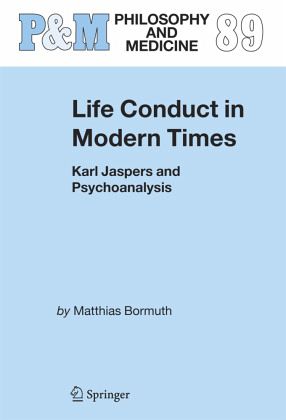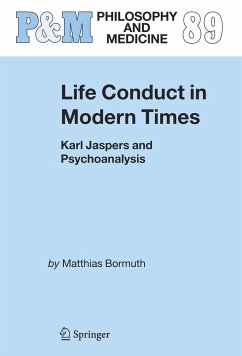
Life Conduct in Modern Times
Karl Jaspers and Psychoanalysis
Versandkostenfrei!
Versandfertig in 6-10 Tagen
76,99 €
inkl. MwSt.
Weitere Ausgaben:

PAYBACK Punkte
38 °P sammeln!
We read, but we are also read by others. Interferences of these readings. Forcing someone to read himself as he is read (slavehood). Forcing the others to read me as I read myself (conquest). 1 Simone Weil Karl Jaspers was born in Oldenburg in 1883, grew up in a liberal-minded banker's family, studied medicine and was granted a chair in philosophy at the Uni- 2 versity of Heidelberg in 1922. The decisive factor in this appointment was Jaspers' 1919 monograph Psychology of World Views (Psychologie der Weltanschauungen), 3 which founded so-called 'existence philosophy'. What is less known is tha...
We read, but we are also read by others. Interferences of these readings. Forcing someone to read himself as he is read (slavehood). Forcing the others to read me as I read myself (conquest). 1 Simone Weil Karl Jaspers was born in Oldenburg in 1883, grew up in a liberal-minded banker's family, studied medicine and was granted a chair in philosophy at the Uni- 2 versity of Heidelberg in 1922. The decisive factor in this appointment was Jaspers' 1919 monograph Psychology of World Views (Psychologie der Weltanschauungen), 3 which founded so-called 'existence philosophy'. What is less known is that in 1913 Jaspers had already published an epoch-making methodological systematics, his General Psychopathology (Allgemeine Psychopathologie), which had established 4 him as an authority in the field of psychiatry in the German-speaking world. As a result of this as well as the fact that Jaspers addressed questions concerning physi- 5 sicians' self-identity, Jaspers is now celebrated as oneof the "classic figures of 6 medicine". 1 Weil (1990), pg. 134. 2 Karl Jaspers (1883-1969) worked as a psychiatrist in Heidelberg starting in 1909, and from 1914 on he held a position as a Privatdozent for psychology in the Department of Philosophy after having completed his Habilitation. In 1920 he was granted an assistant professorship and in 1922 a chair in this department. In 1937 he was forced to retire because his wife was Jewish. In 1945 he was reinstated.














